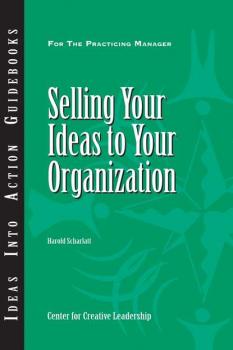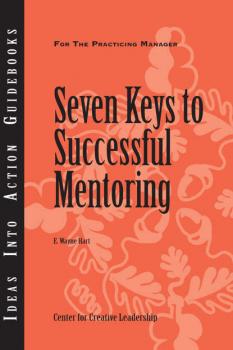Зарубежная деловая литература
Различные книги в жанре Зарубежная деловая литератураSelling Your Ideas to Your Organization
If you've got an idea you want to sell, you need to do two things: scan your environment and use effective tactics. This guidebook explains how to scan your environment and provides a collection of tactics you can use to sell your idea. Using this systematic approach will make you more likely to accomplish your objective – solving a problem or making an improvement for the benefit of individuals, groups, and the organization as a whole.
Seven Keys to Successful Mentoring
Mentoring is an intentional, developmental relationshiop in which a more experienced, more knowledgeable person nurtures the professional and personal life of a less experienced, less knowledgeable person. Both mentors and mentees realize many benefits from mentoring, as do organizations that encourage, structure, and support mentoring. Effective mentors develop the leadership capacity of their mentees while increasing their own skills. They transfer their knowledge and expertise back into their organizations. They nurture the alignment between employee aspirations and organizational imperatives, and they create depth and loyalty within their organizations. Leaders who take mentoring seriously and handle it effectively have a profound impact.
The Handbook of Leadership Development Evaluation
With the increase in the number of organizational leadership development programs, there is a pressing need for evaluation to answer important questions, improve practice, and inform decisions. The Handbook is a comprehensive resource filled with examples, tools, and the most innovative models and approaches designed to evaluate leadership development in a variety of settings. It will help you answer the most common questions about leadership development efforts, including: What difference does leadership development make? What development and support strategies work best to enhance leadership? Is the time and money spent on leadership development worthwhile? What outcomes can be expected from leadership development? How can leadership development efforts be sustained?
The Successful Leadership Development Program
Praise for The Successful Leadership Development Program «Byrne and Rees share their direct experience to provide a highly practical guide for organizations seeking more self-managed approaches to learning in leadership development programs. It will stimulate and encourage all concerned who ask how they can better align the learning needs of individual leaders with those of their organization.» —J. Herman Gilligan, principal, GC International Consulting Group «I have seen the results of the process outlined in this book and have found them to be very powerful and effective. This is a must read and a great guide for anyone responsible for leadership development in an organization.» —Marchita Marino, senior vice president, human resources, Wuesthoff Health System, Inc. «Everyone concerned with growing leaders must read this book. The mapping out of a set of practices for leadership development is the most results-oriented that I have read about in decades. Every possible detail is addressed.» —Robert C. Preziosi, director, Leadership Impact Lab, Nova Southeastern University «This is a unique book essential to any leader or potential leader responsible for bottom-line performance. An experienced based how-to book, the reader will learn how to prepare, obtain approval, and implement a program that will develop leaders and thereby improve and maintain financial performance.» —Allen C. Minor, financial consultant; and adjunct professor, department of health administration and human resources, University of Scranton
Best Practices in Leadership Development and Organization Change
In this important book, successful organizations—including well-known companies such as Agilent Technologies, Corning, GE Capital, Hewlett Packard, Honeywell Aerospace, Lockheed Martin, MIT, Motorola, and Praxair—share their most effective approaches, tools, and specific methods for leadership development and organizational change. These exemplary organizations serve as models for leadership development and organizational change because they Commit to organizational objectives and culture Transform behaviors, cultures, and perceptions Implement competency or organization effectiveness models Exhibit strong top management leadership support and passion
Law and Ethics in Coaching
This book provides an easy-to-read introduction to the core ethical and professional issues faced by all coaches irrespective of length of coaching experience. The case studies and guidelines in this book will help coaches constructively reflect on their coaching practice, and will help build the solid ethical foundation that professional coaching practice demands. A very useful text for both the beginning and experienced coach. –Anthony M. Grant, PhD, Director, Coaching Psychology Unit, University of Sydney «Pat Williams is quickly becoming the authority on the ethics of the coaching profession. He brings his full integrity and passion to this wonderful book. Do not overlook the importance of this book to your success.» –Laura Berman Fortgang, MCC, pioneer in the coaching field and author of Take Yourself to the Top and Now What? 90 Days to a New Life Direction The first comprehensive book covering ethical and legal guidelines for personal and executive coaches As coaching grows into a unique and fully established profession, coaches are already discovering and dealing with the special ethical and legal dilemmas that can arise in the coaching context. Law and Ethics in Coaching presents the first comprehensive look at ethical and legal issues in coaching. From coach-client conflicts to conflicts of interest, from assessments to informed consent, the authors detail the breadth of ethical quandaries in coaching and provide highly practical advice for avoiding problems–and for solving them. With contributions from leaders in law, ethics, and coaching, the text includes coverage of: * The emergence of the coaching profession and its intersection with ethics and law * Foundations of ethics for professions * Making ethical choices * Getting, growing, and measuring coaching ability * Developing and maintaining client trust * Multiple-role relationships in coaching * Ethical use of assessments in coaching * Legal issues and solutions for coaches * The intersection of culture and ethics in organizations * Coaching into the future Filled with a dynamic blend of case studies, discussion questions, illuminating quotes, and other examples, Law and Ethics in Coaching is both a trailblazing professional reference and an unparalleled textbook for coaching programs.
Winners in the Second Half
Later career, 'the second half of the game', is not, as it is often perceived to be, a period of decline or a black hole, but an inspirational time of Generative Leadership and a challenging opportunity for better tactics. This book explores common fears and uncertainties about the second half of the game, enabling you to feel comfortable exploring opportunities previously outside of your comfort zone and feel confident about your future. The common language and frameworks will help you to influence your organisation to create innovative new models and opportunities around leadership, both for yourself and your colleagues. Cases and stories from high profile business, public sector and sports professionals along side practical diagnoses, will inspire, show you how to take more personal control and determine what combination of things you really want in the second half – with the tools and techniques to make this happen. This is a practical leadership guide for anyone in management concerned with what their life, career and leadership capabilities will look like once they approach and enter what used to be the traditional 'retirement' age and move into the second half of the game. David Grayson, Director of the Doughty Centre for Corporate Responsibility at Cranfield School of Management, «I know from both the demographic data across the developed world and the personal experiences of many people that I meet socially and professionally that Julie is on to something very timely with her message.»
The Five Literacies of Global Leadership
New research has exposed our leadership paradigm as a outdated mess of flawed models and practices. By working with great leaders and observing their common attitudes and behaviours, Richard Hames has cracked a universal code based on intelligence, appreciation and collaboration. This code unlocks Five Literacies of Global Leadership. These behaviours are the trade secrets of the artists and alchemists among us. Often instinctively, these leaders charge others with energy, search for new perspectives and embrace diversity. And they are driven by dialogue. This book reveals approaches and attitudes that they all share – and that can make anyone an exceptional leader.
Business Skills All-in-One For Dummies
Fulfil your workplace potential with this indispensable handbook. Written by a team of experts, Business Skills All-in-One For Dummies is your complete guide to perfecting your communication, management and organizational skills. Inside you'll find simple techniques for improving your performance at work – everything from presentation skills, project management, persuading and influencing people, motivating (yourself and others!), managing your workload, managing a team and much more. No other book offers you this much in one volume. It's like having a whole team of business, communication and management experts sitting on your bookshelf…but much less crowded! Inside you'll find 4 books in 1: Book I: Communicating Effectively (covering communication, presentations, body language, confidence, persuasion & influence) Book II: Building Your Commercial Acumen (covering accounting and budgeting, technology, selling, negotiation) Book III: Managing and Leading Others (recruiting, working in teams and groups, dealing with ethics and office politics, coaching, leadership) Book IV: Increasing Productivity and Performance (time management, project management, achieving goals, motivation, managing stress, organising time, managing meetings and dealing with emails).
The 9 Disciplines of a Facilitator
What takes place in the head and heart of an effective facilitative leader? How do they find the inner resources to draw upon? What is the source of their powerful effect on people and situations? The 9 Disciplines of a Facilitator examines these questions and explores the self-mastery it takes to become a great facilitator. Written by Jon and Maureen Jenkins, two of the long-term members of the International Association of Facilitators (IAF), this much-needed resource explains that facilitation is more than a process or a set of techniques for managing groups—facilitation is its own profession with its own set of disciplines that help define the facilitator's role. Throughout the book the authors detail the nine personal disciplines of effective facilitators: Detachment, Engagement, Focus, Awareness, Action, Presence, Interior Council, Intentionality, and a Sense of Wonder.









